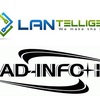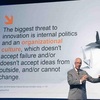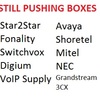Tuesday I was in Vegas at the Channel Partners Conference mainly for the TCA events. At the TCA Channel Chief Summit, Tiffani Bova of Gartner and Rauline Ochs of IPED Market Bridge Alliance presented research. The take away for me was in perspective.
No one buys the way most service providers sell. That's why we are always searching for Consultative Sales Professionals. Because the whole industry sells what they want - and it is followed up by a series of me-too.
Just because one CLEC is selling Managed Security does not mean that the marketplace wants it or will buy it or that it will want it delivered that exact way. It also doesn't mean that the next eight CLEC's or service providers need to market that same offering.
The market is consuming technology differently. It enters the business via the consumer. About 70% of devices are owned by the consumer in the business environment. Only about 30% are paid for by the business. That means support for devices either isn't available or is imposed on the IT staff by the employees. That's a confusing (and expensive) way to handle it. Don't you agree?
Most of what Bova and Ochs presented had to do with mobility and Cloud. Mobility is a huge problem for most CLEC's as the model for cellular sales is unprofitable - whether they sign a wholesale, agent or MVNO contract - the margin on cellular is thin to none.
And what is prompting Cloud? Two things: ubiquitous broadband and a mobile workforce.
Ubiquitous is really hyperbole because even with 3G, 4G and wi-fi, you can't get bandwidth everywhere and even when it is available it is shoddy (like at tech conference hotels).
Mobile workforce means a couple of things. One that more businesses have accepted remote workers - whether at home locally, across the country or across the globe. The economic downturn (and all the consolidation) has translated into businesses having less workers but expecting more work. This means working at home, while on the road, etc. Hence, not just email, but the application data has to be available from any authorized, connected device. That is the beauty of Cloud.
Cloud changes the way business is done.
Read that again, because that means it has to be sold that way.
It's easier to sell email, because everyone has email and it is almost a requirement. Selling unified messaging gets more complicated. Unified Communications and Collaboration is just too complex of a sale, of an explanation, of an implementation, of a deployment. That's where the service providers want to go, but they neglect the challenge of the sale. There is a lack of the story, the sales triggers, the value proposition, the WHY, and of course the on-boarding.
One thing Bova pointed out was that VDI (virtual desktop) sales have grown in EMEA (Africa and Mid-East) while have stagnated in North America. One reason: VAR's have too big a quota with HP or Dell to take a 500 desktop refresh to VDI instead of selling 500 desktops. Not just the quota for the discount, but to sustain Gold level service. It's the same with Cisco, Microsoft, etc. VAR's will keep selling what they sell for 2 reasons: First, to maintain the current level of vendor support to continue to service current clients in the manner that is expected (or even contracted). Second, making the changes to shift business to an MSP or all service model is complicated and expensive. Bova suggested firing clients and employees to create the business you will need in 5 years, but that's easy to say from a consulting seat. Not so easy from a business owner perspective.
When EarthLink told its channel partners in Tampa that it only wanted Multi-Site multi-access opportunities, it didn't come right out and say that it would stop selling T1's, but that was the underlying message. (And ELNK did tell me that 1GB and 10GB private line, even ON-net, was not what they wanted to sell.) That's one way to start planning for where you want to be. Say no while being specific about what you are looking to offer.
As a whole I don't think the service providers have any idea what buyers are buying or why. Just because you WANT to sell MPLS with security or Hosted UC&C or whatever, doesn't mean that prospects will actually BUY it (that way).
When does something become a commodity? When the customer buys it directly online.
For non-commodity services, you need a well trained sales force that understands the brand, the value proposition, and the target. As an industry we aren't there yet.
I'm going to leave you with that.
Coming soon two posts: (1) Master Agents are like Pharma Reps. (2) Tech Data versus Master Agents.













